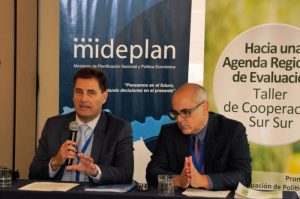Committed to the evaluation of Government Policies in Latin America

The capital of Costa Rica, San José, has hosted the celebration of the workshop “Towards a Regional Assessment Agenda”, within the framework of the project for the Promotion of the Evaluation of Government Policies in Latin America and the Caribbean. The project’s main objective is to generate evidence to ease decision making from public institutions.
The main objective of the workshop was to exchange experiences among the six countries that are part of the project (Colombia, Costa Rica, Ecuador, Paraguay, Peru, Uruguay) for the preparation of the National Evaluation Agendas, to improve and harmonize the public policies in the face of regional and global challenges.
On the other hand, two joint evaluation processes have been designed among the participating institutions, which are part of the Inter-institutional Working Group for the Evaluation of Public Policies in Latin America, formed in 2015, based on the work in this area carried out the FIIAPP. It is an innovative experience that introduces the comparative approach between national policies on evaluation.
Specifically, the joint evaluations outlined in this meeting have been on gender equality policies (Costa Rica and Colombia) and on disaster risk prevention (Ecuador and Colombia, to which Peru, Costa Rica and Peru will join during the coming months). Uruguay), two key issues in the region. Both evaluations have already begun to be implemented and the terms and bases of harmonization of procedures have been defined.
The Deputy Minister of National Planning and Economic Policy of Costa Rica (MIDEPLAN), María del Pilar Garrido, highlighted the importance of the model of intra-regional cooperation that is being carried out in the project, in which the joint work between the institutions allows the harmonization of the frameworks for action and, even, of the national agendas in terms of evaluation. For his part, the director of the FIIAPP, Pedro Flores, has stressed the importance of public interventions being based on evidence to have a positive impact on citizenship.
In this way, the fact that policies can be observed and shared among several regional actors, from a comparative or joint perspective, allows us to define which aspects of public action are most important in improving the living conditions of populations. The workshop also counted with the participation of the National Institute of Women of Costa Rica (INAMU), which gave a specialized vision to the definition of gender policy evaluation.
The event was also attended by representatives of the Delegation of the European Union in Costa Rica, the Latin American Faculty of Social Sciences (FLACSO), the State of the Nation of Costa Rica, UNFPA, UN Women and the other participating institutions. the project: Office of Planning and Budget (OPP) of Uruguay, General Budget Office of the Ministry of Finance (MH) of Paraguay, National Secretariat of Planning and Development (SENPLADES) of Ecuador, Ministry of Economy Finance (MEF) of Peru and the National Planning Department (DNP) of Colombia.







